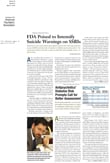Congress appropriated modest increases for nearly every federal mental health and substance abuse program this fiscal year, a trend that is likely to continue in Fiscal 2005.
The budget for the National Institutes of Health increased by 3.7 percent, or $1 billion, for a total of $27.9 billion, according to the final omnibus appropriations bill (HR 2673) signed into law in January.
Congress agreed, however, to reduce nonmilitary and nondefense discretionary budgets by 0.5 percent this fiscal year, so the final NIH budget increase comes to 3.2 percent, according to Lizbet Boroughs, an associate director in APA’s Division of Government Relations.
Although this is more than the president’s requested increase of 2 percent for NIH, which the House of Representatives passed last year, it fell significantly short of the 10 percent boost advocated by the Ad Hoc Group on Medical Research Funding, Boroughs said.
APA participates in three coalitions that develop annual recommendations for federal health and mental health funding that are distributed to Congress. The Ad Hoc Group on Medical Research Funding focuses primarily on congressional appropriations for NIH, and the Mental Health Liaison Group (MHLG) focuses on congressional appropriations for the Center for Mental Health Services and the National Institute of Mental Health (NIMH), National Institute on Drug Abuse (NIDA), and National Institute on Alcohol Abuse and Alcoholism (NIAAA).
The third coalition in which APA participates is the Coalition for Public Health Funding, which recommends that programs and agencies within the Department of Health and Human Services (HHS) be adequately funded to meet the needs of the public, according to a coalition mission statement. APA’s Division of Government Relations co-wrote both the ad hoc group and MHLG appropriations recommendation documents, which were distributed to Congress last year.
Boroughs explained that the Ad Hoc Group on Medical Research Funding and MHLG decided to advocate for a 10 percent increase for the NIH budget based on an estimated inflation rate of 3 percent to 4 percent for state-of-the-art medical research and a 6 percent to 7 percent desired growth rate in grants to accelerate the pace of research, said Boroughs.
NIH Director Elias Zerhouni, M.D., presented the Bush administration’s Fiscal 2004 NIH budget request to the House Appropriations Subcommittee on Labor, HHS, and Education almost a year ago.
Zerhouni testified then that the president’s budget request “will allow us to support our highest research priorities and continue the momentum we gained during the historic doubling of the NIH budget,” according to his statement posted online. These priorities include obesity, diabetes, and implementing the provisions of the Best Pharmaceuticals for Children Act, which became law last year (Psychiatric News, September 19, 2003).
The legislation requires NIH to conduct studies in children of drugs no longer under patent and to provide technical assistance to drug companies that agree to conduct pediatric studies of their patented medications in exchange for an additional six months of patent protection.
Zerhouni said that the administration’s proposed increase for Fiscal 2004 of 2 percent would enable NIH “to continue to support about 1 in 3 of the research grant applications we receive.”
Boroughs told Psychiatric News that although the Senate approved a 3.2 percent increase for NIH, the Senate mandated that NIH use 2.2 percent of the increase to evaluate all its grant programs, leaving only 1 percent for biomedical research funding.
Mental Health, Addictions Institutes
NIMH, NIDA, and NIAAA received budget increases of between 2.92 percent and 2.99 percent this fiscal year. This represents a $41 million increase for NIMH over Fiscal 2003 and was the amount requested by the president. Congress increased the Fiscal 2004 budget for NIDA and NIAAA by $30 million and $13 million, respectively, which was a few million dollars less than what the president had requested.
After the 0.5 percent reduction for nonmilitary and nondefense spending mandated by Congress, the Fiscal 2004 budget totals for NIMH, NIDA, and NIAAA are $1.38 billion, $992 million, and $429 million, respectively, Boroughs noted.
CMHS Budget Battle
The Bush administration proposed that the Center for Mental Health Services (CMHS) budget be reduced by $22.9 million in Fiscal 2004.
The programs designated for reductions were the Community Mental Health Services Performance Partnership Block Grant, Protection and Advocacy for Individuals with Mental Illness, Jail Diversion Program Grants, Addressing the Needs of Children and Adolescents with PTSD, and Mental Health Outreach and Treatment to the Elderly, Boroughs explained.
APA worked with key members of the House Appropriations Subcommittee on Labor, Health and Human Services, Education, and Related Agencies to restore the CMHS funding.
Reps. Patrick Kennedy (D-R.I.), Rosa DeLauro (D-Conn.), and David Obey (D-Wis.) not only restored funding for the CMHS programs, but increased CMHS overall funding by $5 million over its Fiscal 2003 budget, Boroughs said.
APA praised the president for requesting that Congress increase the budget for the Comprehensive Community Mental Health Services for Children and Their Families Program by $8.2 million and the Projects for Assistance in Transition From Homelessness (PATH) by $6.9 million. Congress appropriated $3.9 million and $6.9 million, respectively, for these programs in the final appropriations bill.
The Fiscal 2004 budgets for the mental health institutes are posted online at http://thomas.loc.gov/home/approp/app04.html. Zerhouni’s testimony is posted at www.nih.gov/about/director/budgetrequest/FY2004budgetrequest.htm. ▪
